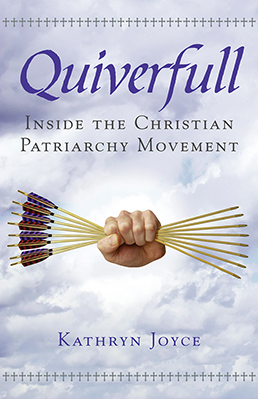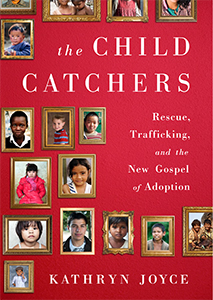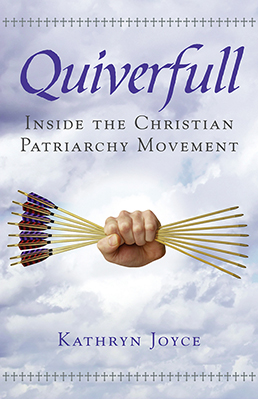
“To my surprise and delight Joyce provides a remarkably sensitive and nuanced depiction of the movement, drawing not only on published works by movement leaders but on extensive interviews with Quiverfull women. …The service provided here is invaluable for those of us not intimately involved with the movement. …What emerges gradually from Joyce’s in-depth reportage is a rich depiction of the complex and complete alternative culture that Quiverfull families have created for themselves.” Read more…
—Milton Gaither, author of Homeschool: An American History
“[An] excellent, frightening new book . . . Quiverfull merits wide readership.”
—Edd Doerr, The Journal of Americans for Religious Liberty
“I can’t forgive the Christian patriarchy movement subjects of this superbly crafted and deeply troubling new book, for their bad faith, cognitive dissonance, and behavioral misdeeds carry heavy consequences. Whether or not they know what they’re doing remains an open question. Kathryn Joyce’s gripping new account, Quiverfull: Inside the Christian Patriarchy Movement, is about Christians who want literally to take over and remake the world by outbreeding everyone else, warping the minds of school-children, justifying bigotry with transparent illogic, and systematically denying civil rights. That most of the violence is committed quietly and privately against women and girls, most of whom accede to it with joy and penitence, will give even the most devoutly and egalitarian Christian reader pause… Few books have so affected me. This is not the sledge-hammer account I might have written. With equal parts curiosity and compassion, Joyce explains how and why tens of thousands of American women have ‘chosen’ forms of subservience that bankrupt and humiliate them, that crimp their mental development and that hurt them physically and lead sometimes to social leprosy. Each female interviewed firmly and confidently speaks her motivations and explains her antifeminism while gleefully ignoring the Malthusian outcome of unfettered fertility.” Read more…
—Lawrence James Hammar, Ph.D., Feminist Review
“Quiverfull provides a comprehensive guide to the theology and political organization of these movements. Beyond being an indispensable guide to this landscape, Joyce’s cultural reporting is the standout of this book, as she travels the country visiting some of the movement’s leading lights, entrepreneurs selling their ideal of domesticated, godly bliss. The reader finds her on a weekend ‘Apron Society’ retreat in rural Tennessee, casting an empathetic eye on a hugely pregnant young woman in the thrall of the submission theology; at the home of the publisher of a widely read magazine, Above Rubies, that peddles an antidote to feminism by promising liberation through submission; and at the authoritarian ministry of Debi and Michael Pearl, whose books on wifely submission and harsh child discipline have sold hundreds of thousands of copies. Read all.
—Sarah Posner, The American Prospect
“Illuminating and frightening….Joyce’s facility with this difficult material is notable….It would be easy to reduce the members of the Christian Patriarchy movement to a fringe group of hard-right kooks and poke fun at them; Joyce stays respectful.”
—Heather Seggel, Bitch magazine
“[I]sightful….The issues Joyce’s book raises are fundamental to our identity as human beings, and as Christians. Perhaps they could stand some reexamination.” Read all.
—Elrena Evans, Christianity Today
“Journalist Joyce has conducted a groundbreaking investigation of a little-known movement among Christian evangelicals that rejects birth control and encourages couples to have as many children as possible. The movement, which takes its name from a verse in Psalm 127, advocates a retreat from society and a rejection of government policies that encourage equal rights for women, pregnancy prevention and an individualistic ethic. Quiverfull families share with more mainline Protestant groups, such as the Southern Baptist Convention, a belief that wives should submit to their husbands. But the group goes further by insisting that children be homeschooled and daughters forgo a college education in favor of early marriage and childbearing. The book probes a San Antonio–based ministry called Vision Forum, which began as a Christian homeschooling resource and now promotes “biblical patriarchy” through seminars and retreats. Members of the movement use militaristic metaphors and see themselves waging a war to win back the culture and rescue American society. The book lacks an in-depth historical account of the movement’s connections to 19th- and 20th-century American fundamentalism or its accommodation with modernity, especially its heavy use of Internet blogs. Yet future historians and journalists will owe Joyce a debt of gratitude for her foray into this still nascent religious group.”
—Publisher’s Weekly, March
“Frightening. Joyce makes …. clear that our freedom—to believe what we choose and to practice those beliefs in peace—starts with our bodies, and our right to choose what to do with them is far from secure.”
—Sacremento News & Review
“In this engrossing look at the evangelical Protestant “Quiverfull” movement, we learn that the conservative patriarchal group takes its name from Psalm 127, which states: “Like arrows in the hands of a warrior are sons born in one’s youth. Blessed is the man whose quiver is full of them.” (In other words, “Want to be in God’s army? Start having babies—as many as God can give you.”)
Stripped of equality, Quiverfull wives are servants of the home and of their husbands. Having an “unsubmissive” wife means a man can’t control his home and is therefore unfit for church leadership. The patriarchy movement doesn’t allow women to have friendships with other women, as the husband should be the only source of emotional support, and it even encourages young women to not merely save themselves for marriage but to save their first kiss for the marriage altar. Skillfully reported by journalist Kathryn Joyce, Quiverfull has echoes of The Handmaid’s Tale. Unfortunately, it’s not fiction.”
—BUST, February/March 2009
“Joyce’s keen reporting . . . will prove to be an invaluable resource for understanding the origins of some of [Rick Warren’s] comments on gender.”
—Sarah Posner, The American Prospect, January 2009
“There has been little study of this tiny but growing pronatalist movement, but with Kathryn Joyce’s Quiverfull: Inside the Christian Patriarch Movement, we now have an excellent resource. Joyce tracks Quiverfull’s genesis and doctrinal roots to untangle the various strands of this complex patriarchal movement and explain why, in the 21st century, a group that eschews modernity and individualism is gaining ground and adherents… Joyce has done some hard reporting to answer these questions: embedding herself within several Quiverfull factions, attending their conferences, and in some cases befriending these women… The result is more a work of anthropology than political tract.” Read all.
—Gillian Kane, Public Research Associates, March 2009
“Joyce is a young feminist schooled in an old-school journalistic style: report, report, report. She enters this world with absolute dedication to getting as much material as possible. She’s not an inflamer or a polemicist, but a dispassionate observer, an information-gatherer, a witness.
What’s most exciting to me is that Joyce is breaking truly new ground here. Much has been written about evangelic Christianity or cultish religious subcultures. It’s a fascinating and important subject. But Joyce has entered a different sort of landscape, one that is uncharted and completely critical to our understanding of how far we’ve come, and how far we’ve got to go if we are going to bring ALL women (and men) along. She’s uncovered a horrifying and very real trend in contemporary America. Next time someone asks you, ‘Is feminism really so necessary anymore?’ just hand them Joyce’s book and say ‘Read up, my friend.'” Read all.
—Courtney Martin, Feministing
“Joyce undertakes a complex enterprise: unraveling the various strands of U.S. Christian fundamentalism that make up the new patriarchy movement, while allowing us to hear the voices of the women and men who are part of it. …Joyce’s anthropological immersion demonstrates that feminists are often peering through the looking glass in trying to understand our fundamentalist neighbors.”
—Abby Scher, Women’s Review of Books
“Great Reads for Winter 2009”
—Ms.,January 2009
“Kathryn Joyce approaches the Quiverfull followers with deep curiosity and the restraint of a good journalist. Joyce’s book is like walking into another world; in fact it is, except that these are a splinter group of the people who are so important to the coalition that Rove put together for the Republican Party.
Patriarchy is essential to understanding the right wing, fundamentalism, and the authoritarian structure of the Republican Party. ‘Quiverfull’—by focusing on one particular theological outlook—provides a detailed window into what we as secularists are up against, and whose power the women’s movement must understand in order to diminish its impact.” Read all.
—Buzzflash
“If any religious movement badly needs critiquing, the self-titled Quiverfull movement does, because its Christian patriarchy seeks to reverse the advances in equality women have made in the last 150 years or so. In this movement of the Christian Right, the author, a journalist, tells us, women are subordinate to men, and their sole Gold-given task is to be mothers and nurturers. Women have no authority outside the home and never any authority over men. All family planning is forbidden; women must have all the babies they can because the Bible tells us so. Joyce discusses the origins and expansion of the movement in Protestant fundamentalist and evangelical circles. She writes in a readable style and has a respectful approach that will appeal to most readers. She doesn’t hesitate to highlight the social and personal damage caused by the movement to women’s physical and mental health and to large and poor families struggling to survive on one paternal income. A modest complaint is that she doesn’t critique the doctrinal roots of the movement in either biblical inerrancy or the authoritarianism of male leaders. Recommended for academic and public collections.”
—Library Journal, January, 2009
“In reading, Quiverfull: Inside the Christian Patriarchy Movement, by Kathryn Joyce, I was fascinated that a self-described secular feminist and professing non-believer could write with such clarity and sensitivity on the Patriarchy Movement that has made major inroads within Fundamental and Evangelical denominations during the past few decades.
I was impressed with the lack of malice in Joyce’s writing and thrilled to see the subject of Christian Patriarchy getting the attention it so desperately needs and deserves. As a Bible believing Christian, I am appreciative of the graciousness Joyce displayed towards the people and the movement she wrote about.” Read all.
—Jocelyn Andersen, author Woman Submit! Christians and Domestic Violence
“I really want to just encourage everyone who has been touched by the Quiverfull philosophy in any way to read this book. Quiverfull puts the whole movement on display all at once. The reason this is important is that for most families, getting into this lifestyle is a step-by-step process — a progression from ‘peculiar’ to seriously bizarre which takes place incrementally over a period of many years. Once a family takes that first step — if they’re living it logically and consistently — they’ll eventually find themselves living out pretty much the whole program — the ‘Vision’ which, in its entirety ~ as clearly depicted in Quiverfull == turns out, in practicality, to be a very real, living nightmare.”
—Vyckie Garrison, No Longer Quivering
“What happens when you are involved in a world where, under the guise of paternalism and biblical stringency, one begins to control the entire life of a woman, calling it the duty of women to submit? This book answers that question, and the answers alternate between the horrifying and the depressing.” Read all.
—Steven Henderson, Internet Review of Books
Advance Praise for Quiverfull:
While mainstream America faced the possibility of a female president, a grassroots movement has been quietly organizing to restore patriarchy—and reduce women to the status of slave-like breeders. Kathryn Joyce gives us a first-ever glimpse into the Christian patriarchy movement, and her riveting reporting makes it all the scarier. If you’ve been feeling complacent about women’s status—read this book!
—Barbara Ehrenreich, author of Nickel and Dimed and This Land is Their Land
“Prairie muffins,” hayrides, and babies—lots of babies—don’t sound like the stuff of fanaticism, but in Quiverfull Kathryn Joyce brings us the news from the most militant frontier of fundamentalism—a “patriarchy movement” of right-wing women who embrace a caricature of 19th century womanhood as a strategy for culture war. At turns funny, terrifying, and heartbreaking, Quiverfull is a necessary book, an empathetic and brilliant analysis of how this small group of believers shape mainstream ideas about motherhood, marriage, sex and gender.
—Jeff Sharlet, author of The Family: The Secret Fundamentalism at the Heart of American Power
The stories Kathryn Joyce tells in Quiverfull are both riveting and deeply disturbing. This important book shines a light on a corner of the Christian right that has taken misogyny to sadomasochistic extremes, and reveals the sexual anxieties so often underlying modern fundamentalism.
—Michelle Goldberg, author of Kingdom Coming: The Rise of Christian Nationalism
Kathryn Joyce’s well-researched book delivers much more than a quiverfull of understanding about this movement that twists religion to justify keeping women barefoot, pregnant, and powerless. It’s also a stark reminder why those who value reproductive justice must actively engage in politics and the public debate.
—Gloria Feldt, author of The War on Choice and former president, Planned Parenthood Federation of America
This is a deeply informed, highly nuanced, and exceptionally valuable text for anyone wishing to explore the religious and political currents that produced the Sarah Palin phenomenon. Perhaps the highest praise one could give Quiverfull is that its “Christian patriarchal” subjects would be hard-pressed not to see themselves as fairly portrayed by the self-described “secular feminist” who wrote it.
—Garret Keizer, author of Help: The Original Human Dilemma






